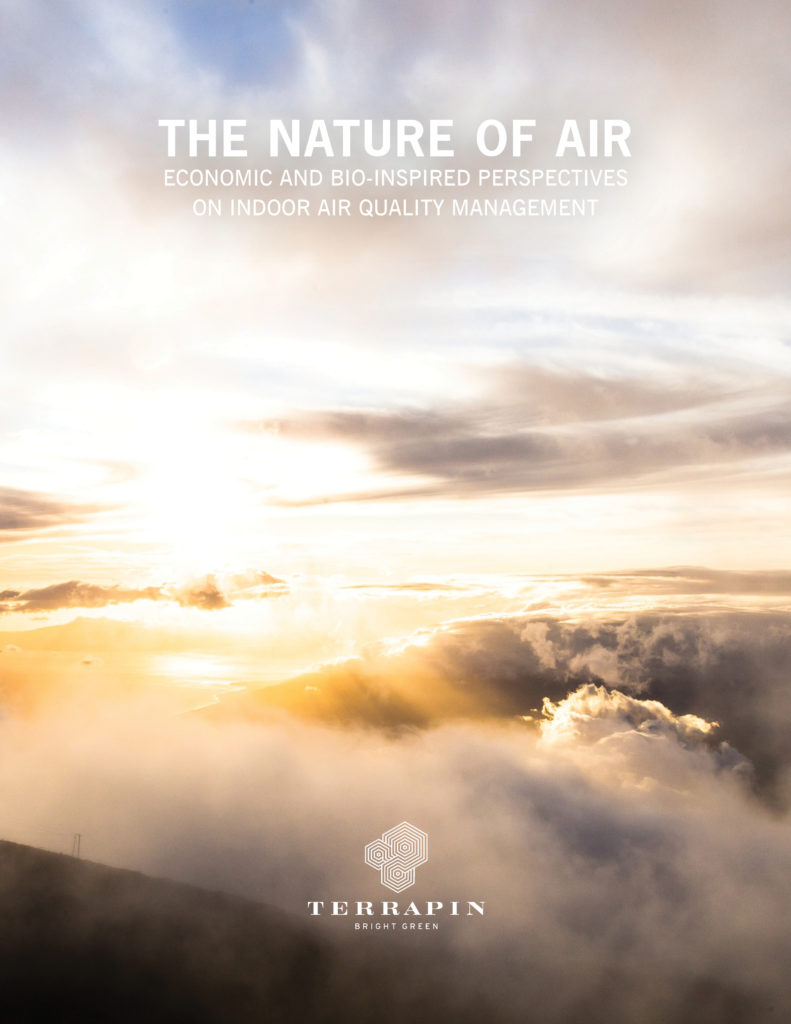

News
Terrapin Releases The Nature of Air
Dakota Walker
Share
Consider your surroundings. You may see a few walls, a computer screen, a window, some people, but there’s one surrounding we tend to forget about; something that we’re in constant contact with; something that we intake approximately 11,500 liters of each day: the air. This ‘void’, as many consider it, often contains harmful microorganisms like mold and bacteria, fine particulate matter, volatile organic compounds, and a host of other pollutants. And while we may not be able to perceive the presence of these common indoor air pollutants, their effects can be significant.
Poor indoor air quality has received greater attention as yet another deterrent of our mental and physical well-being. Despite a growing demand for healthy buildings, IAQ management has remained a design challenge as typical strategies, such as increased filtration, pit energy performance against air quality. Competing outcomes—in this case, energy-efficiency and well-being—can seem intractable, however nature provides a different perspective.
The Nature of Air: Economic and Bio-Inspired Perspectives on Indoor Air Quality Management sheds light on the financial burden of poor air quality as well as the atmospheric mechanisms by which earth is able to addresses air pollution in an energy efficient and circular manner. Sponsored by AtmosAir Solutions, the report goes on to explore how those same mechanisms can be brought indoors to support rethought indoor air quality management, and how one technology–bi-polar ionization–is doing just that.
This whitepaper represents another facet of the ever growing body of research into the human-nature connection. It outlays actionable information that companies can use to improve workplace performance, employee satisfaction, and the bottom line.
Header image courtesy of Jaromir Kavan / Unsplash
Feature image courtesy of Sebastien Gabriel / Unsplash
Dakota Walker
Dakota Walker is an Associate Project Manager & Research Analyst at Terrapin Bright Green. He recently graduated summa cum laude from the University of North Carolina Asheville with a degree in Environmental Management and Policy. Dakota believes the genius of nature has yet to be matched by human innovation. He’s interested in finding new approaches to solving contemporary policy and design challenges that reflect the resilience and resourcefulness of natural systems.
Topics
- Environmental Values
- Speaking
- LEED
- Terrapin Team
- Phoebe
- Community Development
- Greenbuild
- Technology
- Biophilic Design Interactive
- Catie Ryan
- Spanish
- Hebrew
- French
- Portuguese
- Publications
- Occupant Comfort
- Materials Science
- Conference
- Psychoacoustics
- Education
- Workshop
- Mass Timber
- Transit
- Carbon Strategy
- connection with natural materials
- interior design
- inspirational hero
- biophilia
- economics of biophilia
- Sustainability
- wood
- case studies
- Systems Integration
- Biophilic Design
- Commercial
- Net Zero
- Resorts & Hospitality
- Energy Utilization
- Water Management
- Corporations and Institutions
- Institutional
- Ecosystem Science
- Green Guidelines
- Profitability
- Climate Resiliency
- Health & Wellbeing
- Indoor Environmental Quality
- Building Performance
- Bioinspired Innovation
- Biodiversity
- Residential
- Master Planning
- Architects and Designers
- Developers and Building Owners
- Governments and NGOs
- Urban Design
- Product Development
- Original Research
- Manufacturing
- Industrial Ecology
- Resource Management
- Sustainability Plans
- Health Care
- Carbon Neutrality



